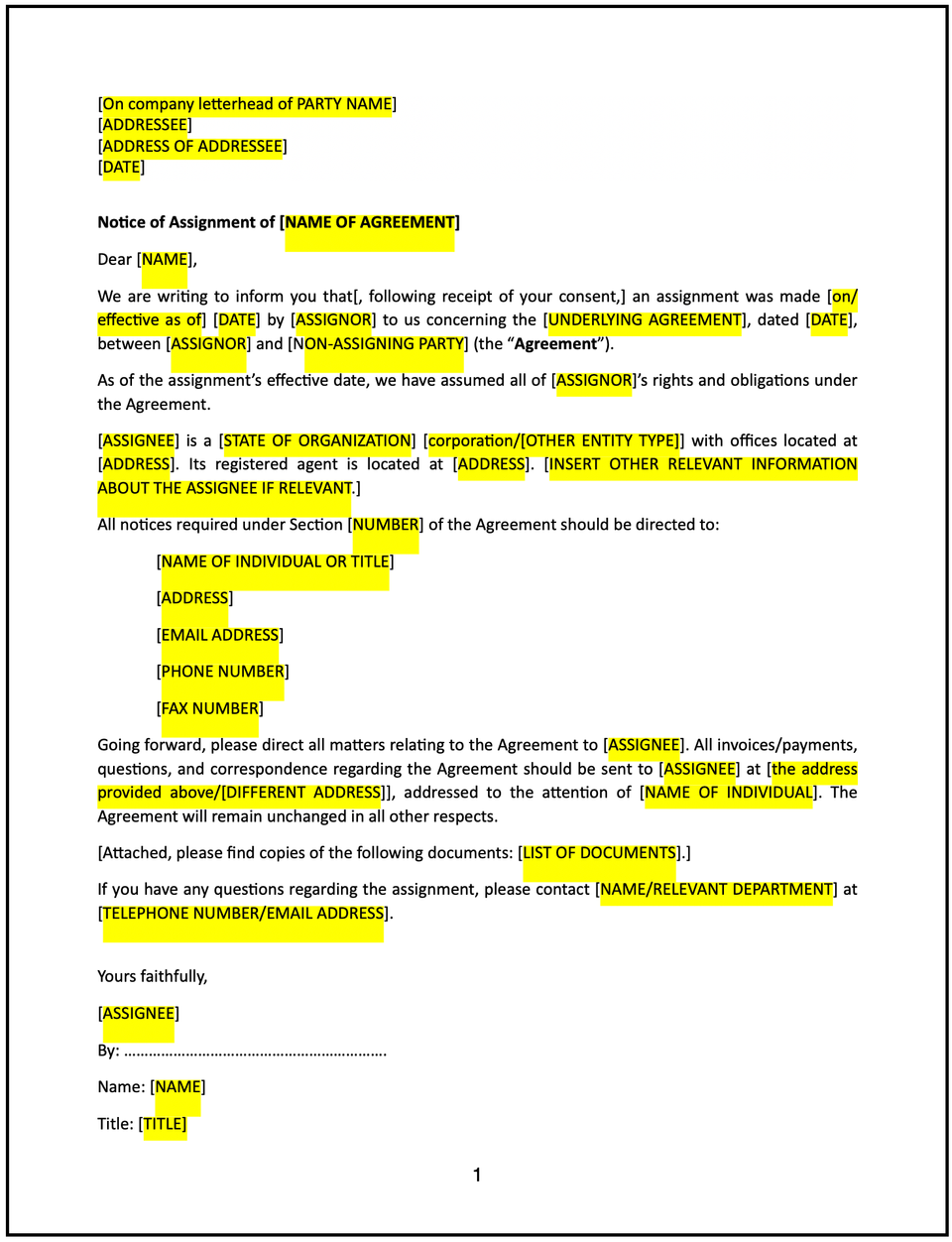Letter of contract assignment to a third party: Free template

Letter of contract assignment to a third party
Assigning a contract to a third party involves transferring the rights and obligations under an agreement to another entity. This letter provides a professional way to notify the other party of the assignment, outline the details, and confirm compliance with the contract’s terms.
How to use this letter of contract assignment to a third party
- Reference the contract: Clearly identify the contract being assigned, including its title, reference number, and the parties involved. Provide the original effective date for context.
- Specify the assignment: Clearly state the assignment to a third party, including the name of the new party and their contact details.
- Explain the rationale: Provide a concise explanation of the assignment, ensuring it aligns with the contract’s terms and purpose.
- Confirm compliance: Reference the relevant assignment clause in the contract and confirm that all necessary conditions for the assignment have been met.
- Address remaining obligations: Clarify any changes in responsibilities, such as whether the original party remains liable for certain terms.
- Maintain a professional tone: Ensure the letter is respectful and focused on maintaining transparency and alignment.
- Request acknowledgment: Ask the other party to confirm receipt of the letter and agree to the assignment, if required.
Benefits of using a letter of contract assignment to a third party
This letter template provides a professional and transparent way to notify and confirm a contract assignment while maintaining accountability and clarity. Here’s how it helps:
- Ensure transparency: The letter proactively informs the other party of the assignment, reducing misunderstandings.
- Confirm compliance: Referencing the relevant contract clause ensures the assignment aligns with the agreement’s terms.
- Clarify responsibilities: Outlining the assignment’s details and implications ensures all parties remain aligned.
- Provide documentation: The letter serves as a formal record of the assignment, which is useful for legal or auditing purposes.
- Preserve relationships: A respectful tone and clear communication help maintain positive relationships with all parties involved.
Tips for writing an effective letter of contract assignment to a third party
- Be specific: Clearly reference the contract and the party to whom the rights and obligations are being assigned.
- Confirm compliance: Reference the assignment clause and confirm all necessary conditions have been fulfilled.
- Use professional language: Maintain a respectful and factual tone to ensure the letter reflects professionalism.
- Clarify roles: Clearly outline any changes in responsibilities or liabilities resulting from the assignment.
- Keep it concise: Focus on the key points and avoid unnecessary details or commentary.
Frequently asked questions (FAQs)
Q: What details should I include in this letter?
A: Include the contract reference, the name of the third party, the rationale for the assignment, and confirmation of compliance with the assignment clause.
Q: Do I need the other party’s consent for the assignment?
A: It depends on the contract terms. Some agreements require prior written consent for assignments.
Q: Who typically receives this letter?
A: Send the letter to the other party or parties involved in the contract, typically their legal or operational representatives.
Q: How formal should this letter be?
A: The tone should be professional and respectful, reflecting the significance of the assignment.
Q: When should this letter be sent?
A: Send the letter promptly after the assignment decision is made or per the notice requirements in the contract.
Q: Does the original party retain liability after assignment?
A: It depends on the contract terms. Some assignments release the original party from liability, while others do not.
Q: Is acknowledgment from the other party required?
A: Yes, acknowledgment is typically required to confirm the other party’s understanding and agreement to the assignment.
This article contains general legal information and does not contain legal advice. Cobrief is not a law firm or a substitute for an attorney or law firm. The law is complex and changes often. For legal advice, please ask a lawyer.


